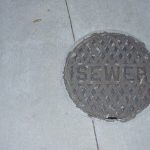If you’re a homeowner, you’ve probably experienced the unpleasant scenario of your house smelling like a sewer when it rains. This issue can be not only embarrassing but also concerning. In this blog, we will explore the reasons behind this problem and provide solutions. We’ll draw insights from the experts who have an informative blog on the subject. So, if you’re dealing with a similar issue or want to be prepared, read on!
Understanding the Problem
When you notice your house smells like a sewer during rainy weather, it’s crucial to realize that the issue is not just about an unpleasant odor. It might indicate a more significant problem with your plumbing system. This could include sewer line blockages, damaged pipes, or issues with your drainage system.
Rainwater and Your Sewer System
Understanding how rainwater interacts with your sewer system is crucial to comprehending why your house might smell like a sewer when it rains. The relationship between rainwater and your sewer system can help pinpoint the root causes of this issue.
- Saturation of Soil: When your house smells like a sewer when it rains, soil saturation is where the ground surrounding your home becomes filled with excess water due to heavy rainfall. When the soil becomes saturated, it can no longer absorb additional moisture, causing the water to pool on the surface or seep deeper into the ground. This saturation process is a natural response to heavy rain but can lead to significant pressure changes within your sewer system. As the soil becomes inundated with water, it can exert additional pressure on your sewer lines, potentially affecting the normal flow of sewage and causing sewer gases to escape through any available openings or weak points in your plumbing system. Understanding the impact of soil saturation is vital in addressing sewer odor issues during rainy weather.
- Hydrostatic Pressure: The increased moisture in the ground exerts hydrostatic pressure on your sewer lines. This pressure can be substantial, especially during prolonged or heavy rainfall. It can cause the foot to swell and press against your sewer pipes, which may lead to cracks or joint separations.
- Infiltration and Inflow: Infiltration refers to rainwater entering your sewer lines through cracks, leaks, or damaged pipes, while inflow involves surface water entering the system through maintenance hole covers, cleanouts, or other openings. When it rains, the extra water can infiltrate or inflow into your sewer system, increasing the pressure within your pipes.
- Pushing Sewer Gases: The additional pressure inside your sewer lines can cause sewer gases, which usually flow in one direction towards the central sewer system, to reverse order. This reversal can force these gases to escape through any available openings, including those within your home.
- Gases and Odors: Sewer gases, primarily composed of methane, hydrogen sulfide, and other harmful compounds, have a distinctive and unpleasant odor. When these gases are pushed into your home due to rain-related pressure changes, they can create the distinct smell of a sewer within your living space.
Common Causes of Sewer Smells During Rain
Several factors can contribute to your house smelling like a sewer when it rains. Let’s delve into some of the most common causes:
- Blocked Sewer Lines: Blocked sewer lines are a common cause of unpleasant odors in your home when it rains. Over time, various materials like grease, debris, soap scum, and even invasive tree roots can accumulate within your sewer pipes, obstructing the flow of wastewater. During heavy rain, the added volume of water can exacerbate these blockages, creating pressure imbalances within the sewer lines. This pressure can force sewer gases to escape through any available openings or cracks in your plumbing system, leading to the foul-smelling odor that can permeate your living spaces.
- Damaged Sewer Pipes: Damaged sewer pipes can significantly cause sewer odors in your home during rainy weather. These pipes, which are responsible for carrying wastewater away from your house, can become compromised due to various factors. Cracks, corrosion, or physical damage to the pipes can create openings through which sewer gases can escape. When it rains, the increased water flow can exacerbate the problem by increasing the pressure within the lines. This can lead to a release of foul-smelling gases into your home, causing an unpleasant odor.
- Inadequate Ventilation: Inadequate ventilation in your plumbing system is a significant factor in the problem of your house smelling like a sewer when it rains. Proper ventilation involves a network of vent pipes that allow sewer gases to escape from your plumbing system and exit safely through the roof of your house. When these vent pipes become blocked, damaged, or are not functioning correctly, they can no longer perform their essential role. As a result, sewer gases may not vent properly, and during periods of heavy rainfall, increased water flow can create pressure changes in your plumbing system. This can force sewer gases to seek alternative escape routes, such as openings or cracks in your pipes, ultimately leading to the unpleasant odor entering your living space.
- Faulty Sewer Traps: A false sewer trap can significantly contribute to a sewer smell in your house, particularly during rainy weather. A sewer trap, typically in the form of a U-shaped pipe, is designed to hold water to create a barrier that prevents sewer gases from entering your home. However, when this trap dries out, becomes damaged, or is incorrectly installed, it can allow sewer gases to escape into your living space. During heavy rainfall, when the plumbing system experiences increased water flow and pressure changes, a faulty sewer trap can be more prone to failure.
- Septic Tank Issues: Septic tank issues can be a significant factor in the problem of your house smelling like a sewer when it rains, especially for homes that rely on septic systems. During heavy rain, the soil around the septic tank can become saturated, increasing the risk of leaks, overflows, and sewage backup. When a septic tank overflows or leaks, it can release foul-smelling sewage and sewer gases into the surrounding area, including your home.
- Sewage Backup: Sewage backup is a distressing plumbing problem that occurs when wastewater from your home’s drains and toilets fails to flow correctly through the sewer lines and instead reverses its course, flooding into your home. This can result from various factors, including clogs, pipe blockages, or a surge of water overwhelming the sewage system during heavy rains or flooding. Sewage backup poses significant health and safety risks due to the contaminated nature of the water, which may contain harmful bacteria and pathogens. It can lead to property damage, foul odors, and the need for extensive cleanup and sanitation.
- Sewer System Design and Age: The design and age of your sewer system can significantly influence the likelihood of your house smelling like a sewer when it rains. Older sewer systems, especially those constructed using outdated materials or techniques, may be more susceptible to problems. Over time, the structural integrity of pipes and connections can deteriorate, increasing the risk of leaks, blockages, and odors. In contrast, modern sewer system designs incorporate more durable materials and improved construction methods, making them less prone to issues.
- Lack of Backflow Prevention: Lack of backflow prevention is a significant factor contributing to the issue of your house smelling like a sewer when it rains. Backflow prevention devices are essential in plumbing systems designed to ensure that wastewater flows in only one direction, away from your home. When these devices are missing or not functioning correctly, they allow the potential backflow of contaminated water and sewer gases into your plumbing system. During heavy rain, increased water pressure can create a situation where sewage from the municipal sewer system or septic tank may flow backward into your home’s plumbing. This can introduce foul odors and potentially harmful contaminants into your living spaces, causing the unpleasant sewer smell you notice during rainy weather.
What Can a Plumbing specialist Do?
A plumbing specialist can play a crucial role in diagnosing and resolving the issue of your house smelling like a sewer when it rains. Here’s a more detailed look at what a plumbing specialist can do:
- Inspection: A plumbing solution specialist will begin by thoroughly reviewing your plumbing system. This inspection is critical to pinpoint the exact cause of the problem. During the examination, the plumber may use advanced tools and techniques, such as video inspections and pressure testing, to identify issues accurately.
- Clearing Blockages: If the problem is due to blocked sewer lines, a plumbing specialist will use specialized equipment to clear these blockages. This process may involve using high-pressure water jets or drain snakes to dislodge and remove obstructions. Clearing blockages ensures that your sewer lines can flow freely once again, preventing backups and odors.
- Repairing Damaged Pipes: If the cause of the sewer odor is damaged sewer pipes, a plumbing specialist is equipped to address this issue. They may use various repair methods, such as pipe relining or pipe replacement, to fix damaged or corroded sections of your sewer lines. Repairing or replacing these pipes is essential in preventing sewer odors from infiltrating your home during rainy weather.
- Ventilation Maintenance: Proper ventilation in your plumbing system is vital for preventing sewer odors. A plumbing specialist can inspect and maintain your vent pipes to ensure they are functioning correctly. Vent pipes allow sewer gases to escape safely through the roof, preventing them from entering your home. If vent pipes are blocked, damaged, or not functioning as they should, a plumber will address these issues to maintain proper ventilation.
- Expert Guidance: Besides resolving the immediate issue, a plumbing specialist can provide expert guidance on preventing similar problems. They may offer recommendations for regular maintenance, suggest preventive measures, and provide insights on maintaining a healthy plumbing system.
Preventive Measures
Preventive measures are essential to avoid the unpleasant situation of your house smelling like a sewer when it rains. Here are some proactive steps you can take to prevent such issues:
- Regular Plumbing Maintenance: Schedule routine plumbing inspections and maintenance with a professional plumber. Regular check-ups can identify and address potential problems before they escalate into significant issues, preventing sewer odors during rainy weather. This includes checking for blockages, leaks, and any signs of pipe damage.
- Tree Root Management: Consider periodic and regular root inspections and treatments if trees or shrubs are near your sewer lines. Tree roots commonly cause blocked sewer lines as they can infiltrate and damage pipes. By proactively managing tree roots, you can prevent blockages and sewer odors.
- Rainwater Management: Properly manage rainwater runoff from your property. Ensure rainwater drains away from your home’s foundation and the sewer system. This can help reduce the pressure on your plumbing system during heavy rainfall and minimize the risk of sewer odors.
- Install Backflow Prevention Devices: Backflow prevention devices are crucial to prevent contaminated water from re-entering your plumbing system. Ensure these devices are correctly installed and regularly inspected to avoid the risk of sewer odors.
- Septic Tank Maintenance: Regular maintenance is essential if your home has a septic system. Have your septic tank inspected and pumped as recommended to prevent overflows and odors during heavy rain.
- Proper Ventilation: Ensure that your plumbing system’s vent pipes are free from obstructions and functioning correctly. Proper ventilation allows sewer gases to escape safely through the roof, preventing them from entering your home.
- Sump Pump Maintenance: If you have a sump pump in your basement, ensure it is in good working condition. A sump pump helps prevent flooding and sewer backups during heavy rain. Regular maintenance and testing of the pump can help keep your home dry and odor-free.
- Upgraded Plumbing Systems: In some cases, an older plumbing system may be more susceptible to issues. Consider upgrading your plumbing system to more modern materials and techniques that resist damage and odors.
- Consult a Plumbing specialist: When in doubt or experiencing recurring issues with sewer odors during rainy weather, consult a plumbing specialist. They can provide expert advice, inspections, and solutions tailored to your plumbing system.
- Educate Household Members: Educate your family about the importance of proper plumbing usage. Avoid flushing non-biodegradable items down the toilet and dispose of cooking fats and oils in the trash rather than down the drain.
Experiencing your house smelling like a sewer when it rains is distressing. However, with the assistance of a plumbing specialist and by implementing regular maintenance and preventive measures, you can effectively address and prevent such issues in the future. Their expertise can be invaluable in maintaining a healthy and odor-free home.





